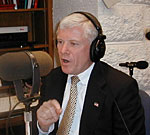By Michael Khoo
Minnesota Public Radio
December 5, 2001
|
| RealAudio |
News of a potential $2 billion shortfall in the state budget has shifted the budget debate from apportioning surpluses to plugging leaks. Amid a fresh round of finger-pointing, state lawmakers and Gov. Jesse Ventura are already defining a new debate over how to manage the projected deficit. Republicans say they'll fight to protect recent tax cuts, while DFLers say those reductions are a key part of the problem. Ventura says he'll keep all options open.
| |
|
|
|
||
Before the forecast was revealed, lawmakers were already projecting a substantial shortfall in state revenues. The announcement, however, predicts the drop-off will be almost twice what most had anticipated.
The $2 billion gap is double the amount the state has in various reserve funds. Gov. Ventura, however, told the Minnesota Chamber of Commerce he was not ready to panic. He says the state can rely on reserves to buy time until a permanent solution is in hand. But he made clear all options are on the table.
"I think we can weather this storm without raising taxes, but I'm not ruling out anything at this point. No one can if they're being honest with the public," Ventura said.
House Republicans clearly disagree. Speaker Steve Sviggum says his caucus will resist any attempts to roll back sweeping property and income tax cuts enacted in recent years, or any other attempt to raise revenues through increased taxation.
"We will not raise taxes," Sviggum said. "Now, to me, a tax increase is a specific income and/or sales or property tax increase. And we will solve this budget problem without raising taxes."
Sviggum did leave open the possibility of an increased gas tax, but he likened that to a user fee dedicated to transportation projects. Sviggum also said Republicans will trim the budget in a way that safeguards spending on education and long-term health care.
But the conservative Taxpayers' League says nothing on the spending side should be considered sacred.
"It would probably be not advisable to say that these are off the table. I mean, health care is where there's probably a lot of streamlining that can be done. The private sector did a lot streamlining in the '90s, and now it's really obvious government needs to do the same," says Linda Runbeck, the league's president and a former state senator.
Other interest groups, however, are pressing their own solutions. Wayne Cox, the executive director of Citizens for Tax Justice, a group sponsored by labor interests, says last session's property tax reductions caused spending to balloon as the state bought down local tax burdens.
Cox says any solution to the current deficit should revisit the property tax reforms. "They wrote a hot check, and now that hot check has come back non-sufficient funds. The first thing they ought to do is to take off the books the spending that they put into law for the property tax changes that they don't have the money to pay for," Cox says.
Senate DFLers say they'll wait for a roadmap from the governor's office before the weigh specific options.
Senate Majority Leader Roger Moe made it clear he feels the problem is related to recent tax cuts and not new spending initiatives. Moe says the Senate will focus on an "aggresive" bonding bill to jumpstart public works projects.
"For one single reason: to put Minnesotans back to work. And if people are back to work they're going to be paying taxes and they're going to be buying things. So that is one way. So we want to fast-track as many projects as we can," according to Moe.
Senate leaders are calling on the governor to convene a special session to get an early handle on the deficit. House Republicans have said they don't yet see the need for the Legislature to return before next month.
More from MPR
